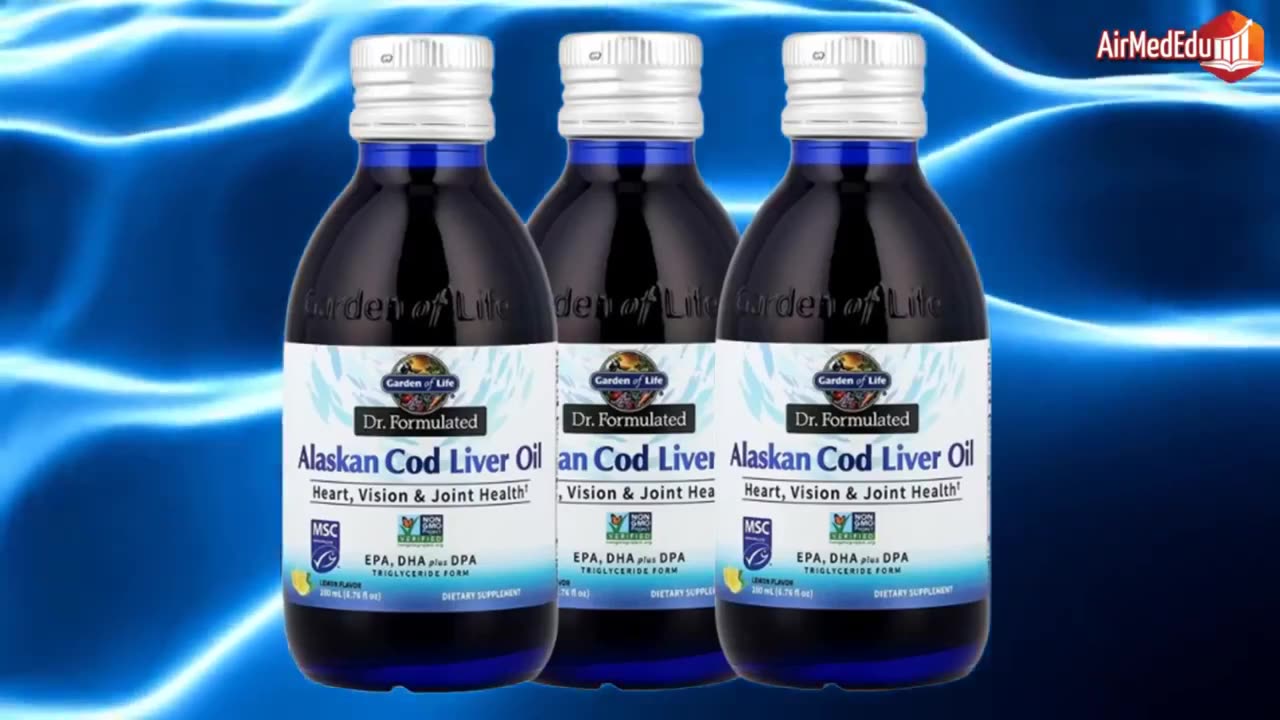Premium Only Content

Effect of Cod Liver Oil on the Body
Cod liver oil has been a traditional remedy for centuries, extracted directly from the liver of this Atlantic fish, known for its richness in essential nutrients. From ancient fishing communities in Northern Europe to its modern use as a nutritional supplement, this oil has gained a reputation for its properties that support overall health. Its unique composition includes omega-3 fatty acids such as eicosapentaenoic acid and docosahexaenoic acid, along with high concentrations of vitamins A and D, which act synergistically in the body to promote various physiological processes. When ingested, these components are rapidly absorbed in the digestive tract, integrating into cell membranes and participating in anti-inflammatory mechanisms that reduce the chronic inflammatory response, a key factor in many modern diseases.
Once in the body, cod liver oil exerts its primary action through omega-3s, which modulate the production of eicosanoids, molecules that regulate inflammation and blood clotting. Eicosapentaenoic acid, for example, competes with arachidonic acid in metabolic pathways, decreasing the formation of pro-inflammatory prostaglandins and promoting a healthier immune system balance. This not only helps alleviate joint pain but also protects arterial walls from plaque buildup, improving blood flow and reducing the risk of cardiovascular events. Meanwhile, the vitamin D present in the oil binds to receptors in bone and muscle cells, facilitating calcium absorption in the intestines and promoting bone mineralization, which strengthens the skeleton and prevents muscle weakness associated with nutritional deficiencies common in regions with little sun exposure.
Vitamin A, another key component, acts as a potent antioxidant that protects cells from oxidative damage caused by free radicals, supporting the integrity of mucous membranes and skin. In the body, this vitamin is incorporated into visual processes, improving dark adaptation and maintaining retinal health, while its role in cell differentiation contributes to a more robust immune system, stimulating the production of white blood cells that fight infections. Together, these elements create a holistic effect: the oil not only nourishes but also optimizes metabolic functions, from hormonal regulation to neuronal protection, where docosahexaenoic acid enriches brain membranes, facilitating the transmission of nerve impulses and enhancing synaptic plasticity for improved cognition and mood.
Among the most notable benefits of cod liver oil is its ability to support cardiovascular health, as omega-3s help reduce blood triglyceride levels and maintain balanced blood pressure, which decreases the risk of heart attacks and strokes. Studies have shown that regular consumption can improve the lipid profile, making LDL cholesterol less likely to oxidize and adhere to the arteries. Furthermore, its anti-inflammatory action is particularly useful for people with rheumatoid arthritis, where it reduces morning stiffness and joint pain, allowing for greater mobility and quality of life without relying exclusively on anti-inflammatory medications. In the bone sector, the vitamin D in the oil prevents osteoporosis by improving bone mineral density, especially in older adults or those with sedentary lifestyles that limit the natural synthesis of this vitamin through sun exposure.
Another notable benefit is its impact on the immune system, where the combination of vitamins A and D strengthens the body's defensive barriers, increasing the production of immune cells such as macrophages and lymphocytes, helping to more effectively fight viral and bacterial infections. For mental health, docosahexaenoic acid and eicosapentaenoic acid contribute to reducing symptoms of depression and anxiety, as they modulate serotonin and dopamine levels in the brain, promoting emotional balance and preventing cognitive decline associated with aging, such as Alzheimer's. In terms of skin health, the oil combats premature aging by neutralizing free radicals, maintaining skin hydration and elasticity, and reducing the appearance of wrinkles thanks to its antioxidant effect. In the prevention of diabetes, its components help improve insulin sensitivity, protecting pancreatic cells, and regulating sugar metabolism.
For pregnant women, cod liver oil can be beneficial in supporting fetal development, particularly in the development of the baby's brain and eyes, thanks to its docosahexaenoic acid, although it should always be consumed under medical supervision to avoid excesses. In children, it has historically been used to prevent rickets, a disease caused by vitamin D deficiency, by promoting healthy bone growth and a strong immune system during development. Additionally, its role in reducing chronic inflammation makes it useful for conditions such as asthma or allergies, where it modulates an overactive immune response. In general, incorporating this supplement into the diet can boost daily energy levels, improve concentration, and support faster recovery after intense exercise by reducing oxidative stress in the muscles.
Regarding dosage, it is essential to adjust consumption according to individual needs and professional recommendations, as it varies depending on age, health status, and purpose of use. For healthy adults, a typical dosage ranges from 1 to 2 teaspoons (approximately 5-10 milliliters) of liquid oil per day, or 1-2 1000-milligram capsules, providing approximately 80-90 mg of eicosapentaenoic acid and docosahexaenoic acid per capsule, along with moderate amounts of vitamins A and D. For specific conditions such as triglyceride reduction or cholesterol control, higher doses, up to 20-30 milliliters daily, may be required, but always divided into doses to improve absorption and minimize digestive discomfort. It is recommended to take it with meals to enhance its bioavailability and reduce the risk of acid reflux.
For children, doses are lower, generally half those for adults, adjusted for body weight. It is suggested to start with flavored liquid forms for ease of intake. In cases of vitamin deficiency confirmed by blood tests, a doctor may recommend higher therapeutic doses, but without exceeding the safe daily limits of no more than 3,000 micrograms of vitamin A and 100 micrograms of vitamin D to avoid toxicity. The duration of treatment also matters; for long-term benefits, such as cardiovascular support, consistent intake for months is ideal, while for specific corrections, such as seasonal vitamin D deficiencies, courses of 3-6 months are sufficient. The key is always to avoid self-medicating and to monitor vitamin levels through regular testing.
Despite its benefits, cod liver oil can cause side effects, especially if consumed in excess or without precautions. The most common include stomach upset, such as nausea, diarrhea, or heartburn, due to its high fat content, which can irritate the digestive tract in sensitive individuals. Many report a persistent fishy aftertaste or bad breath, which is mitigated by taking capsules instead of liquid. In high doses, the accumulation of fat-soluble vitamins can lead to toxicity. Excess vitamin A causes symptoms such as dizziness, blurred vision, headaches, and liver problems, while vitamin D can cause hypercalcemia, with fatigue, muscle weakness, and kidney damage. Furthermore, its anticoagulant effect increases the risk of bleeding, particularly in surgeries or wounds.
Other less common effects include allergic reactions in people sensitive to fish, manifested as hives, swelling, or shortness of breath, which require immediate attention. In the long term, uncontrolled consumption could interfere with the absorption of other vitamins, such as vitamin E, or alter hormonal balance. To minimize these risks, choosing purified products that eliminate contaminants such as mercury or PCBs, common in fish, is crucial, as the liver accumulates environmental toxins. If persistent symptoms appear, discontinue use and consult a professional is imperative.
Precautions are essential to avoid complications when consuming cod liver oil. Before starting, it is vital to consult a doctor, especially if you are taking anticoagulant medications, as omega-3s enhance their effect and increase the risk of bleeding. For diabetics, it can alter glucose levels, requiring medication adjustments, while for hypertensive patients, it could lower blood pressure too much if combined with antihypertensive drugs. Pregnant or breastfeeding women should limit their intake to avoid exceeding safe levels of vitamin A, which in excess can affect fetal development, although in moderate doses it supports pregnancy. People with severe kidney or heart failure should avoid it, as it can overload these organs.
Choosing brands certified for sustainability and purity is another key precaution, avoiding products with unnecessary additives or from unregulated sources. During the summer, when sun exposure increases natural vitamin D production, reducing the dose prevents overdoses, alternating with regular fish oil if necessary. Monitoring early symptoms and performing regular checkups ensures safe use, maximizing benefits without risks. In short, this supplement, when taken responsibly, can be a valuable ally for health, but moderation and expert advice are non-negotiable.
-
 18:31
18:31
Nikko Ortiz
13 hours agoKaren You Need A Shower...
2.41K6 -
 9:47
9:47
MattMorseTV
14 hours ago $6.52 earnedDemocrats CAUGHT in $15,000,000 LIE.
6.76K25 -
 43:24
43:24
ThisIsDeLaCruz
16 hours agoWhat Fans Never Knew About Falling In Reverse’s Guitarist
1.08K -
 24:53
24:53
GritsGG
12 hours agoInsane 3998 Warzone Wins! Rank 1 Player Keeps 36 Win Streak!
1.41K -
 LIVE
LIVE
Lofi Girl
3 years agolofi hip hop radio 📚 - beats to relax/study to
181 watching -
 55:46
55:46
PandaSub2000
12 hours agoBeyond Good & Evil | ULTRA BEST AT GAMES (HD Edited Replay)
16.2K2 -
 3:11:36
3:11:36
FreshandFit
10 hours agoAlex Stein & Madison Cawthorn With Miami Latinas
195K59 -
 2:00:32
2:00:32
Badlands Media
14 hours agoOnlyLands Ep. 31: The Post-GART Hangover Show
71.3K36 -
 LIVE
LIVE
The Rabble Wrangler
13 hours agoBattlefield "Deputy Games" with The Best in the West!
739 watching -
 2:03:43
2:03:43
TimcastIRL
11 hours agoTrump Declares Antifa FOREIGN Terrorists, It Has Begun | Timcast IRL
235K125